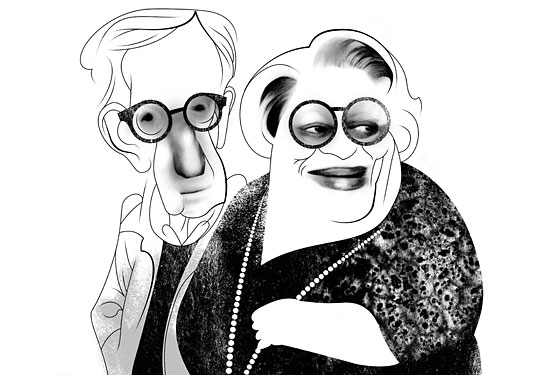
Woody Allen:
“In the seventies, I was playing a lot of poker, and someone said, “You know, there’s a game up at Elaine’s late at night, after they close.” And so I went up there, and it didn’t take long before I became a habitual customer.
At the time, I was single, so I wasn’t cooking for myself. It was an easy place to, you know, drop into. It wasn’t stuffy. You didn’t have to dress. You didn’t have to make a reservation. The atmosphere was very up, and even late at night, you could always find some action. After a short while, Elaine always held a table for me; it was right after the door to the other room. And for a ten- or twelve-year period, I went nearly every night.
I wasn’t a table-hopper or anything. I’m not a social person. I would quietly sit with my friends—non-showbiz people. But it was very nice to be able to look around and see all those faces from movies or sports pages or political pages. Over the years, I saw all kinds of celebrities. Fellini was there. I saw Simone de Beauvoir. I saw the mayors of New York—Koch, Giuliani. Baseball players and boxers. I mean, it was just … it was sort of amazing. You saw people you didn’t see in any other place in town. Why that was is an interesting question that’s never been answered. It wasn’t a particularly beautiful place—physically beautiful—though the lighting was good. It was a flattering light. I think celebrated people went there because you could relax. Nobody would bother you. You weren’t hit on for autographs or gawked at, because everybody in the place was well known. And Elaine wouldn’t hesitate to throw someone out if they were causing trouble. Absolutely. I’ve seen her run right across the floor, her hands under a guy’s arm, and throw him right through the front door and out on the street. She was a perfect innkeeper, so to speak.
People didn’t come for the food. That’s for sure. I always had the theory that Elaine wouldn’t have gotten as big a crowd if the food had been superb. They went up there to chat and socialize and because of Elaine’s personality. She ran the place in a unique way. She was always there. You could go up and talk to her, but she also wandered around, going table to table. She’d sit down and chat with you and always had interesting things to say or funny anecdotes, because she knew everybody.
Elaine was a classic character that could have been in a movie or musical. She was vastly overweight, and she had a real gruff presence, and yet she was a lovely person—amusing and loyal and protective. A good friend you could count on. I, myself, didn’t need anything from her, but she was legendary for helping out writers and other people financially. I went back a long time with her, to maybe the mid-sixties, when I started doing stand-up in the Village. She was a fan; she was supportive. I shot scenes for at least three movies in Elaine’s: Manhattan, Manhattan Murder Mystery, and Celebrity. It was the logical place when I was telling the story. Elaine would have been perfect casting, you know, but she was never in those scenes; we always shot in the morning, and I don’t think she woke up till noon.”
As told to Jada Yuan.